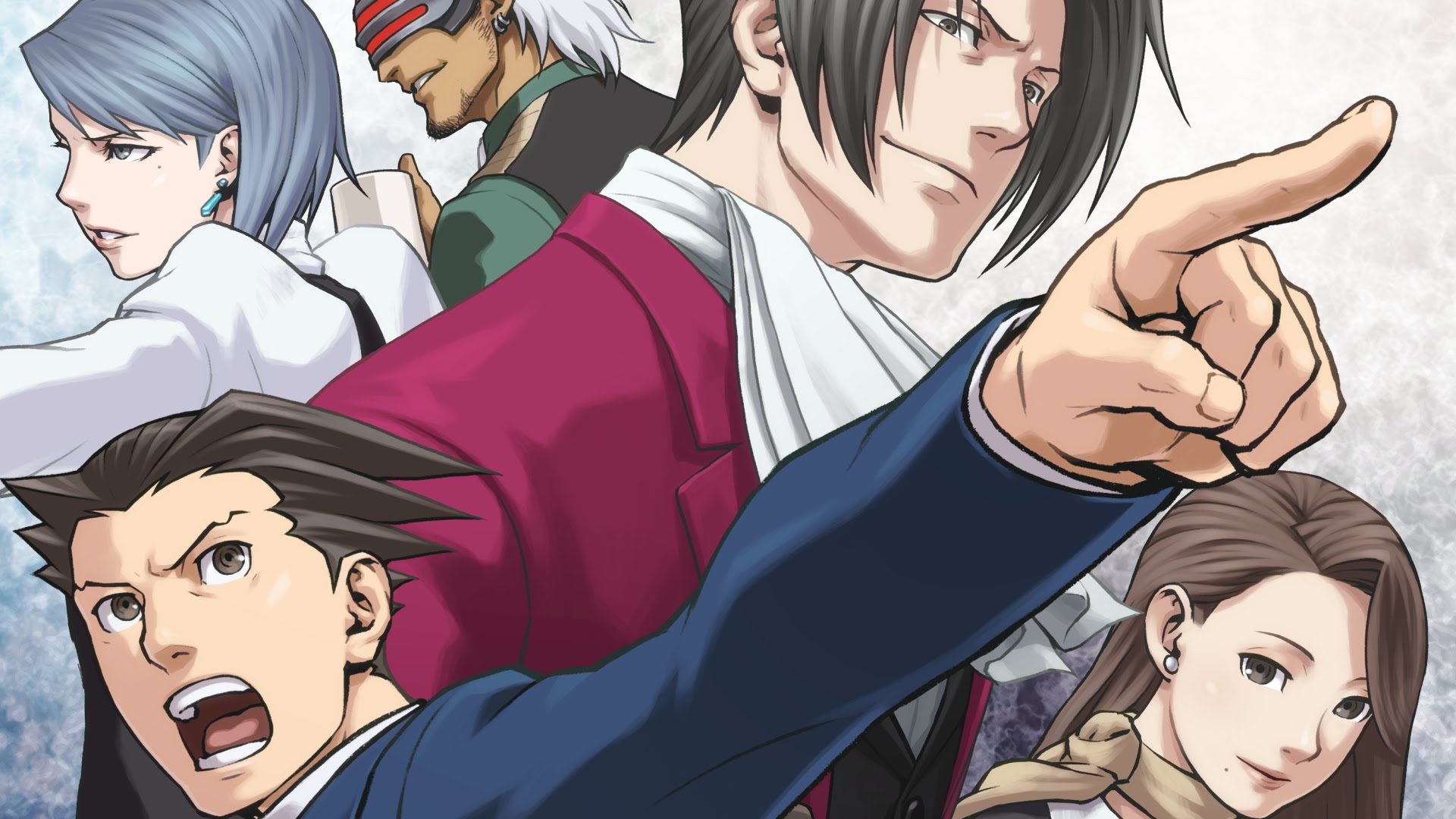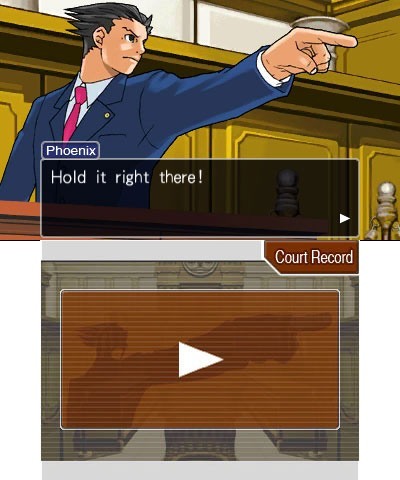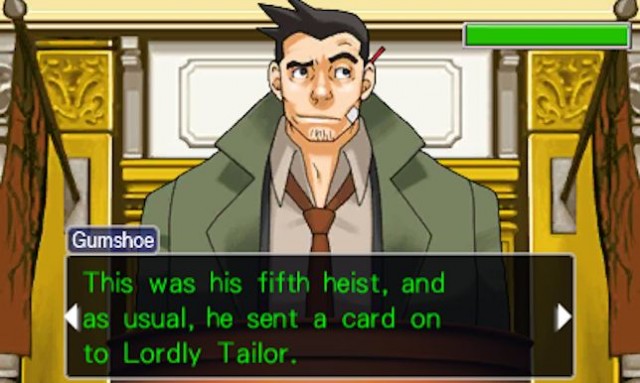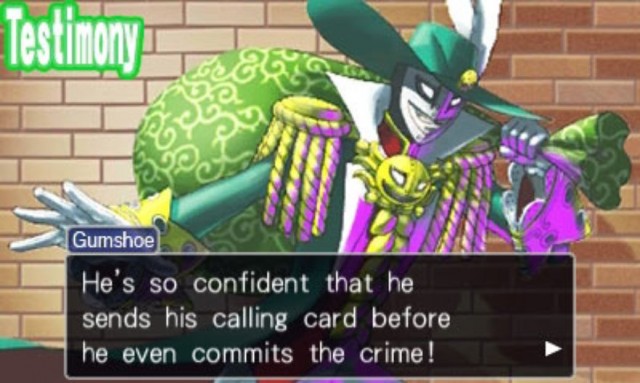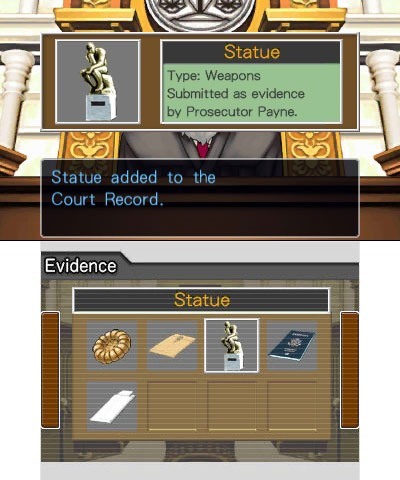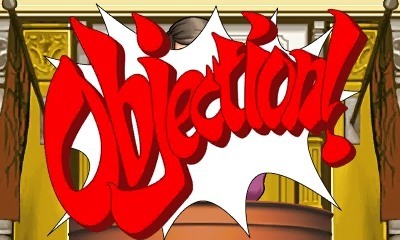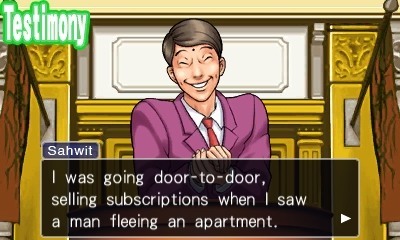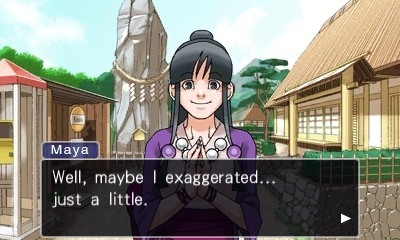In most video games, wars are fought with guns and blades. In Ace Attorney, your many battles are fought with the truth.
When the original Gyakuten Saiban (roughly translated as ‘Turnabout Court‘) debuted on the Game Boy Advance way back in 2001, it began a revolution for the Japanese gaming industry, creating a thrilling experience that was nonetheless devoid of real action, instead relying on players to use their minds to defeat their opponents. Sadly, the future Ace Attorney Trilogy’s original Game Boy Advance incarnations never made it outside of Japan, presumably since Capcom assumed a lack of interest from more traditional action-focused Western audiences. When the DS came however, with its focus on offbeat, accessible and extra imaginative experimental gameplay, Capcom took a chance on localizing Gyakuten Saiban in North America, as Phoenix Wright: Ace Attorney, thus sparking the same revolution, along with an unexpected new renaissance for classic point-and-click adventure games, for the West.
From there, the two Game Boy Advance sequels received their own DS remasters worldwide, and Ace Attorney has since become one of Capcom’s most beloved recent game properties amongst Nintendo gamers. The original Phoenix Wright: Ace Attorney trilogy that started it all would next be ported to WiiWare and iOS, and now, we can experience the three original adventures of Phoenix Wright on 3DS, in one complete package, as Phoenix Wright: Ace Attorney Trilogy, which is exclusively available to download from the 3DS eShop outside of Japan, for $29.99. Sadly, the games aren’t available separately, and all three must be downloaded together, for those who may own some, but not all of the original DS releases.
On that note, if you already own all three of the original games on DS, there’s little reason to invest in the 3DS bundle, beyond the addition of a small visual boost and a 3D effect, the latter of which will be moot to anyone playing on a 2DS. All 3DS and 2DS handhelds are backwards-compatible with the entire DS library, so you’d essentially be buying the same games twice.
Still, for the curious and the nostalgic, Phoenix Wright: Ace Attorney Trilogy packs in three outstanding perjury-probing point-and-click adventure games, and is an especially great way for newcomers to get their feet wet with this eccentric, but highly enjoyable series of games. The 3DS versions currently stand as the ideal ports of these three games, for what that’s worth, even though their gameplay content is entirely unchanged from their original DS builds. Still, whatever your reasons for wanting to double back to the earliest days of Phoenix’s courtroom, the original three games have never been more accessible, nor better-presented!
If you’ve seen the iOS rendition of the first three Phoenix Wright: Ace Attorney games, Phoenix Wright: Ace Attorney Trilogy uses the same slightly updated visual palette. All three games still look like they could fit on the last-gen DS, and are noticeably beneath the most recent Phoenix Wright: Ace Attorney – Dual Destinies in terms of visuals, as that’s a game that’s explicitly built to take advantage of the 3DS, but the 3DS ports definitely look sharper and better-defined than their DS originals. Animations are a bit liveliver, and character models and environments are a tad more vibrant, though the visuals are still flat, hand-drawn anime style, as opposed to the fully three-dimensional character models of Phoenix Wright: Ace Attorney – Dual Destinies.
Likewise, the 3D effect is pretty solid, adding a pretty noticeable degree of atmosphere to the games when it’s cranked up. Those playing on a 2DS, or simply opting to flick off the 3D Slider, aren’t missing too much, but those who do prefer to play in 3D will definitely enjoy a more immersive experience. Cutscenes are a little spottier, as some are in 3D, but many others are merely rendered in 2D, and appear to be entirely unchanged from their original DS renditions. The 3D definitely adds a lot to the more dramatic cutscenes that feature it though, and something about the drama just leaps off of the screen more when you play in 3D, naturally. Be advised however that cranking the 3D Slider all the way up will also stall some of the text crawls and such, for those that are picky about some of the title animations lining up exactly right with the audio.
Some of the extra crisp HD details that you would enjoy when playing the iOS versions on a top-of-the-line iPad are a bit lost in the 3DS ports, though the solid 3D effect helps to compensate for this. These 3DS ports may just barely fall beneath the best-looking way to play the original three Phoenix Wright: Ace Attorney games, but they’re definitely the most gripping way to experience them!
The melodramatic, yet kooky soundtrack behind all three Ace Attorney games remains unchanged from the original DS audio, beyond a mite of added sharpness on 3DS, Each game has catchy and entertaining tunes throughout, whether they consist of the methodical MIDI beats during an investigation, or the mind-tickling allegro tempos of your cross-examining courtroom conundrums. If you have an appreciation for fun video game soundtracks, this is definitely a remaster to experience with headphones plugged in!
The over-the-top sound effects are equally appealing, consisting of tongue-in-cheek ‘whacks’, ‘dings’, and ‘booms’, among many other things that you’d normally expect to hear in a Japanese action game. The audio sounds like it hasn’t been updated since the original Japanese Game Boy Advance editions, and as such, it’s fuzzy and primitive when playing from the 3DS/2DS speakers, and especially headphones.
There’s a small handful of voice clips, namely from Phoenix and his opposing prosecutors, as they yell exaggerated declarations of, “Hold it!”, “Take that!”, and, naturally, “Objection!” Again, they’re unchanged from their original clips, which makes them feel strangely quiet compared to the more pronounced music and sound effects, but they’re as delightful to hear as ever for series fans.
All in all, the audio job isn’t exemplary, but it’s well-preserved, and still functions quite well, even if it’s beneath what the 3DS can actually do. The music is still fun and catchy as ever despite that though!
Phoenix Wright: Ace Attorney Trilogy bundles three games together, all of which have the same gameplay style and fundamentals. The package includes Phoenix Wright: Ace Attorney, Phoenix Wright: Ace Attorney – Justice For All, and Phoenix Wright: Ace Attorney – Trials and Tribulations, all remastered with touched-up graphics and 3D. The game also includes the bonus “Rise from the Ashes” case made for the original DS release of Phoenix Wright: Ace Attorney as a way to take advantage of new DS features for Japan (though this was moot in North America, as we never got the original Game Boy Advance version), at no extra cost, making for five cases per game, with the exception of Phoenix Wright: Ace Attorney – Justice For All, which only has four.
In all three games, you take control of title character, Phoenix Wright, a rookie defense attorney working in a dystopian legal future where all cases must move through court in three days maximum, where prosecutors manipulate the evidence for ‘Guilty’ verdicts, witnesses routinely lie on the stand, and defense attorneys are the last hope for the wrongly accused. Naturally, the game is far from a valid legal sim, and is instead an exaggerated helping of whodunits that has players gathering evidence, then squaring off against ruthless prosecutors to defend clients that have been wrongfully charged with murder.
At their barest foundations, the games are point-and-click adventure games, with a strong mystery flavour. They are divided into two main phases; Investigations, and courtroom battles.
During investigations, players navigate menus with the stylus (you can use the buttons and Control Pad, but the point-and-click style of the Touch Screen is far easier), questioning characters, moving between locations, poking around environments, and gathering evidence that will help clear your client’s name. Each game unfolds on a strictly linear path, so you’ll never risk entering a trial under-prepared, and lacking the necessary evidence to proceed, which is good.
On the negative side however, this means that investigations will routinely be interrupted by players not always having a clear idea of how to proceed. Sometimes, you need to revisit locations, find a hidden clue by examining a room, or present a new piece of evidence to a character you’ve already spoken to, to proceed the game. Problem is, none of the games give you a clear idea of when you need to backtrack and do something like this to keep things moving forward (especially not the first game), which can often lead to the investigations feeling more tedious than they need to be.
Fortunately, building up to the courtroom battles makes everything worth it, and this is when all three games shine the most. Each game has players against a different conniving prosecutor, the corrupt rival, Miles Edgeworth in the first game, the whip-wielding perfectionist, Franziska Von Karma in the second game, and the java-addicted masked bruiser, Godot in the third game, and all three prosecutors are brilliant, aggressive, and constantly ready to tear holes in your case. The only way to battle against them is to cross-examine their witnesses, and expose the lies in the testimonies.
To do this, players can scroll between bits of information in each witness testimony, and can either press a statement, or present evidence proving that it’s a lie, or a mistake that contradicts the facts. By studying the Court Record and paying attention to the story, players will gradually move closer to the truth, and can more easily put together who the real culprit of each murder is. Lies beget more lies after all, and the more you probe guilty and/or dishonest witnesses, the more their subsequent testimonies come apart.
Presenting evidence that proves the prosecution’s witnesses wrong is immensely satisfying, and can simply be done with the buttons and/or Touch Screen, but as with the original DS releases, the very best way to get into each courtroom battle is to use the mic! Whenever you want to press a witness, players can actually shout, “Hold it!” into the mic to have Phoenix press on a statement, and whenever you highlight evidence that proves a contradiction, you can shout, “Objection!” to accuse the witness of being dishonest or mistaken. While it’s no doubt unfeasible if you’re playing in a public place, at least not if you care about looking like a crazy person, playing at home or in a secluded area makes actually shouting commands into the 3DS mic the best and most fun way to play the game.
Pick your objections carefully however! If you wrongfully accuse a witness with the wrong piece of evidence, or make a mistake when illustrating a point when the judge confronts you directly on an observation, your case will take damage, represented by five exclamation marks in the first game, and a life bar in the second and third games. If your case runs out of ‘energy’ because you made too many mistakes, you’ll lose, and your client will be declared guilty, resulting in a Game Over. Fortunately, periodic ‘recesses’ are declared, allowing players to save their game and resume from that point if they fail the case, plus, an autosave can be made at any time if you need to suspend play and return later from that exact point.
Since every case in the trilogy is well-written, creative and often highly amusing, it’s great fun to get acquittals for your clients, surprisingly so! There’s no curveballs for those who have already played these three games, and no real replay value once you’ve completed them all again on 3DS, but they’re all just a huge amount of fun to play for mystery fans and point-and-click adventure fans. The unique gameplay style may have been further improved and expanded upon in the games that followed the original trilogy, but there’s no questioning that all three games have held up incredibly well.
It’s just a shame that the investigations are less fun, and they’re at their most dry in the first game, since the Psyche-Lock mechanic that tried to combine the evidence-presenting courtroom antics during the investigation portions wasn’t pioneered until the second game. In the second and third games, characters will sometimes hold secrets that they won’t tell you during investigations, represented by spiritual ‘locks’ that only Phoenix can see. As you continue investigating and gathering evidence, you can eventually use a special item called a Magatama to confront their secret, and present evidence that gradually crushes the locks. When you have sufficient evidence to get through every lock, the character will spill their secret, and the game can proceed. As with the courtroom however, don’t present carelessly! Your case will still lose energy if you present the wrong evidence when undoing Psyche-Locks, and you can still get a Game Over from making too many mistakes. Know when to back off of a character if you don’t have enough evidence, especially since your case energy is refilled when you successfully get through a batch of Psyche-Locks.
The third game doesn’t add any new mechanics over the previous two, with its big hook being that two of its five cases allow you to play as Phoenix’s mentor, Mia Fey in flashback. It’s more of a story addition than a gameplay addition, but it’s disappointing that it couldn’t change up the gameplay the way that the future follow-ups built expressly for DS and 3DS did.
Still, even if they’re no doubt more simple than the series’ more recent games, the quality of the cases still nicely carry all three games, and make them well worth both re-living, or perhaps experiencing for the first time if you’ve overlooked this series until now. The gameplay has received no upgrades on 3DS, and much of it still feels like it belongs on the last-gen DS, but again, the clever stories and fun courtroom battles are still more than enough to make this package appealing, even beyond its initial handheld generation.
All three games in Phoenix Wright: Ace Attorney Trilogy are exceptionally written, all presenting creative and highly engrossing mysteries with each case. The cases all blend absurdist comedy with surprisingly potent melodrama, and often present a compelling roller coaster of emotions that perfectly blend amusement and dread.
The murders of each case are often pretty outlandish, but that’s a big part of what makes them appealing to solve, especially when their solutions often make a surprising amount of sense, more than they have any right to. Even as you’re faced with impossible odds, with defendants that levitate from crime scenes, or murder a victim in two places simultaneously, among many other ludicrous things, the quest for the truth gives way to revelations that provide very effective surprises and resolutions.
It’s a real testament to this original trilogy that none of the cases feel like weak links, and yet, they all feel very clearly distinct from one another. The game is packed with eccentric, loveable personalities throughout, many of which would feel right at home in a tongue-in-cheek anime, and this helps to endear them to players trying to win them an acquittal, while also motivating them to love hating the true guilty parties.
It’s difficult to talk much about the writing without spoilers, but those who appreciate a great, albeit slightly ridiculous plot will find plenty of that in every last case contained in Phoenix Wright: Ace Attorney Trilogy. Even if you’ve already seen these cases through to the end on another platform before, players who haven’t revisited them in a while will still find each story to be a very enjoyable and often laugh-out-loud trip through memory lane.
Phoenix Wright: Ace Attorney Trilogy doesn’t add any revisions to the gameplay that fans would already find to be very familiar, but its small cosmetic boost and addition of engrossing 3D help to give the three original Ace Attorney games plenty of added punch that they don’t have on other platforms. Again, the package doesn’t contain any real selling points for anyone who already owns the entire trilogy on DS, WiiWare or iOS, beyond that small graphical bump and 3D addition, but if you didn’t get your hands on all of Phoenix Wright’s debuting adventures on another platform, the 3DS bundle is a great way to complete your collection in an accessible way.
The trilogy is an especially great deal for newcomers as well, who may have gotten their start with the 3DS-dedicated Phoenix Wright: Ace Attorney – Dual Destinies, or perhaps as Professor Layton fans who played 3DS crossover game, Professor Layton vs. Phoenix Wright: Ace Attorney, and are interested in the series’ roots. They’ll especially enjoy the kooky, yet satisfying original cases of Phoenix’s law career, even if returning fans will still find the 3DS ports to be well-presented, albeit lacking any interesting new bonuses.
Still, it remains true that the 3DS ports of these three games are the best ports yet, particularly since they maintain the ability to interact with the mic, which is a core advantage to gameplay that isn’t offered on iOS or WiiWare. The main contribution may be a 3D revamp, but considering that it’s three great games with solid 12-15-hour play lengths each, priced together at a very reasonable $29.99, Phoenix Wright: Ace Attorney Trilogy is a great package with plenty of value, and plenty of lie-crushing fun!

